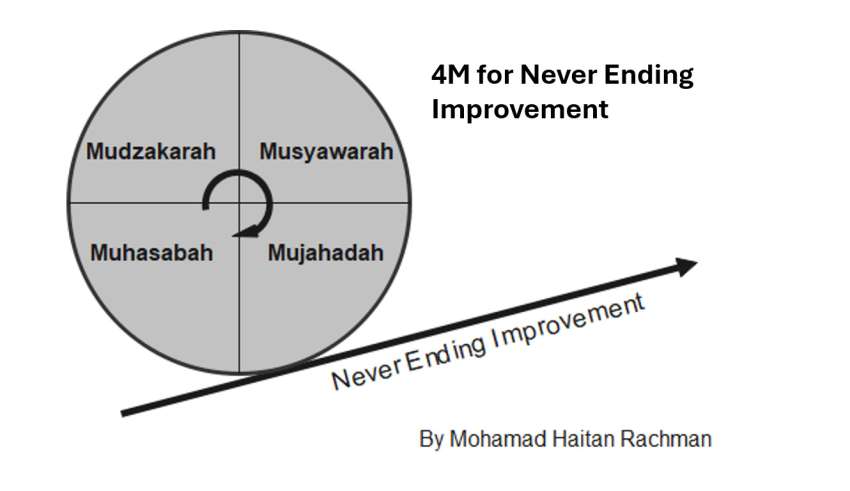*) Gambar sebagai ilustrasi
The 4M Framework as a Systematic Model for Values-Based and Collaborative Continuous Improvement
By: Mohamad Haitan Rachman
Please Use 4M NEI Coach GPT: https://promptai.inosi.co.id/4m-nei-coach-gpt/
Introduction
In an era marked by growing uncertainty and disruption, organizations and individuals are required not only to adapt technically but also to evolve sustainably through a holistic approach. The concept of Never Ending Improvement (NEI) has become a pillar of modern management, yet most prevailing NEI models remain rooted in technocratic logic and procedural efficiency, such as the PDCA (Plan-Do-Check-Act) cycle or Kaizen. Amid the limitations of these linear and instrumentalist approaches, the 4M Framework emerges as a systematic model that synergizes cognitive, collaborative, spiritual, and reflective dimensions into a dynamic cycle of learning and change.
This article aims to elaborate the theoretical foundations and philosophical underpinnings of the 4M Framework as an alternative approach to building values-based improvement and meaningful collaboration across all levels—individual, organizational, and social.
Conceptualizing the 4M Framework
The 4M Framework consists of four key components: Mudzakarah, Musyawarah, Mujahadah, and Muhasabah. Each stage is designed as part of a dynamic cycle not only to generate solutions or change, but also to foster value-driven transformation and character development.
Mudzakarah (Exchange of Knowledge and Thought)
Mudzakarah is a process of open idea exploration and knowledge exchange conducted in the spirit of sincerity and intellectual integrity. In the context of NEI (Never Ending Improvement), mudzakarah is not merely about finding answers, but about building collective awareness of the challenges at hand while opening the door to inspiration and new opportunities. It lays the epistemological foundation of change.
Musyawarah (Deliberation for Decision-Making and Collaboration)
Following idea exploration, musyawarah is needed to agree on concrete actions and optimal solutions. In the 4M Framework, musyawarah emphasizes genuine participation—not mere formality. Here, the collaborative aspect takes center stage: decisions are not only technical calculations, but syntheses of values, social sensitivity, and shared vision.
Mujahadah (Earnest Effort and Self-Discipline)
Mujahadah is the commitment to carry out decisions with determination, discipline, and sincerity. This phase reflects work ethic and the spirituality of action. Mujahadah emphasizes that successful implementation requires not just planning but mental resilience and meaningful intention in every effort.
Muhasabah (Reflection and Self-Evaluation)
No meaningful change occurs without reflection. Muhasabah is a comprehensive evaluation—of performance, process, and motivation—in implementing change. Its purpose is to extract deep insights, correct mistakes, and realign with core values. Muhasabah forms the foundation for the next cycle of mudzakarah, creating a living learning cycle.
Philosophical Foundations of the 4M Framework
The 4M Framework does not emerge from a vacuum. It represents a synthesis of various philosophical and epistemological foundations, including:
Transformational Paradigm
In organizational and leadership theory, the transformational approach emphasizes values, meaning, and deep change at the core of individual and institutional identity. The 4M Framework aligns with this paradigm, aiming not only to improve what is done, but also to transform how and why things are done.
Participatory Epistemology
Mudzakarah and musyawarah position knowledge as a social product—emerging through interaction and intersubjective dialogue. Knowledge in the 4M Framework is not just information but collective awareness built through communication and collaboration.
Spiritual and Ethical Axiology
Mujahadah and muhasabah are rooted in spirituality and ethics. Mujahadah teaches sincerity, pure intention, and the spirit of striving. Muhasabah emphasizes honesty, introspection, and moral commitment. These make the 4M Framework not just a management tool but also a character-building framework.
Systemic Strengths of the 4M Framework
The strengths of the 4M Framework as an NEI (Never Ending Improvement) model include:
- Dimensional Integration: Combines rational (mudzakarah), social (musyawarah), emotional-spiritual (mujahadah), and reflective (muhasabah) aspects.
- Sustainable Learning Cycle: Functions as a continuous, spiraling process—not limited to one project or result.
- Contextual Flexibility: Applicable in various settings such as education, organizational management, community development, and personal growth.
Real-World Applications and Strategic Implications
The 4M Framework has great potential to be adopted as a system for managing change and continuous improvement in various contexts:
- In education, the 4M Framework can foster a learning culture that is reflective, participatory, and meaningful.
- In organizations, it can serve as an alternative approach to implementing the Balanced Scorecard—one that goes beyond indicators to prioritize shared values and processes.
- In communities or social movements, 4M can strengthen citizens’ capacity to create value-driven and collaborative change.
Conclusion
The 4M Framework as a systematic model for continuous improvement offers a more holistic and humanistic alternative to conventional NEI models. By integrating elements of knowledge, dialogue, work ethic, and spiritual reflection, the 4M Framework becomes both a tool and a culture for transformation that is not only efficient but also meaningful.
Moving forward, empirical studies and methodological development of the 4M Framework across sectors are essential to test its validity and solidify its theoretical foundation—positioning it as an original Indonesian contribution to the global field of organizational and human development.
For inquiries regarding training, facilitation, planning, or development services—or for collaboration opportunities—please contact: haitan.rachman@inosi.co.id




